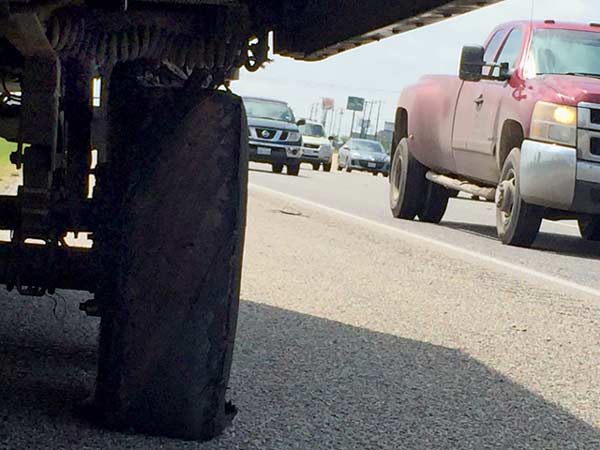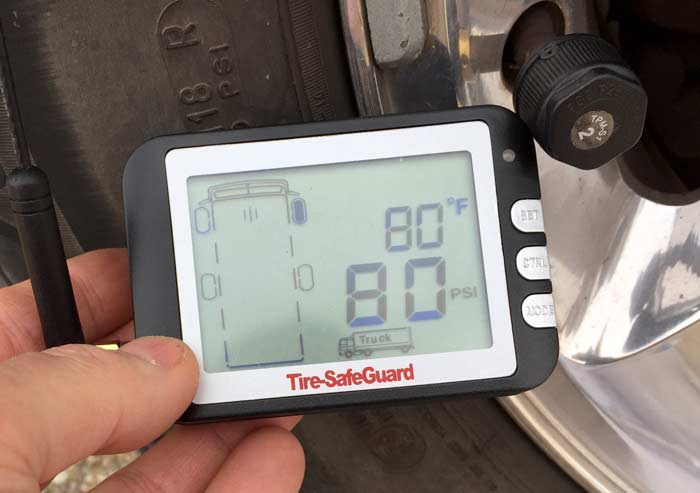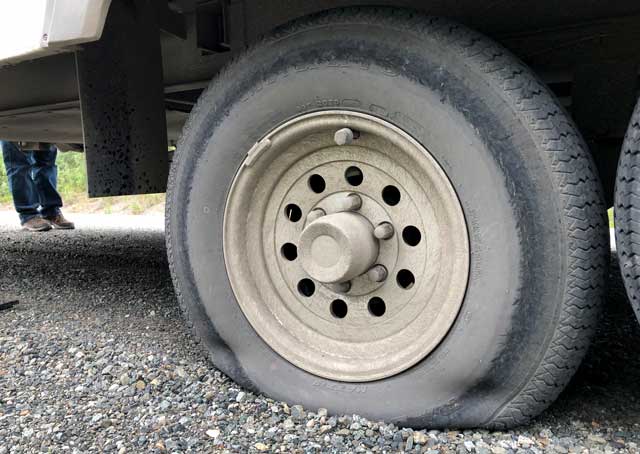
This mistake can cost you your life! (Image: LiveWorkDream.com)
All RV Rookies Make These Big Boo-Boos
It doesn’t matter if you bought your RV to join the thousands of new full-time RV nomads who hit the road this year. Or, if you just want to be a weekend camping warrior. These two big RV rookie mistakes are made by nearly all RVers. Here are the two dumbest RVing errors we made that could have cost us our lives.
RV newbie mistake #1: RVing without roadside assistance.
We bought our first fifth wheel in 2008. Our goal was to enjoy a one-year road trip with our dog who had terminal cancer. But the adventure became a journey with no ending. Although our dog passed on, we are still traveling thirteen years later, and have no plans to quit. Looking back, I cannot believe that we spent our first few years on the road without a roadside assistance plan. Don’t ask me why, I can’t even tell you.
But someone was looking out for us, because nothing terrible happened on our travels during that time. Then one day after a friend’s RV roadside calamity, we woke up to the fact that we were pushing our luck. We enrolled in a popular RV roadside assistance plan and guess what? About six months later, that small annual RV expense paid for itself.
Roadside assistance can save your life—and your RV
We had our first RV tire blowout on Highway 50, the Loneliest Highway in Nevada. Thankfully we had cellular service and could reach out for help, which arrived in less than one hour. A second blowout happened a few years later on Interstate 25. The RV roadside assistance driver came to our rescue, instead of forcing my husband to put his life on the line to change a tire on the shoulder.
Our RV roadside assistance plan really proved its value when we traveled to Alaska. In June 2018 we were less than 100 miles south of the Alaska border when disaster struck. We hit a frost heave, broke a leaf spring, and blew a tire in the Yukon, near the aptly named Destruction Bay.
If you RV, you’ll need assistance someday.
Our RV axle and tire were trashed. The shrapnel also severed our electric over hydraulic brake line, leaving us stranded. Unable to crawl to the next town, we ditched our fifth wheel on the eerily quiet two-lane road and drove to cell service for help.
The next day a lowboy flatbed trailer arrived to tow our home on a whopping six-hour trip south to Whitehorse, the nearest town with services. I asked the tow truck driver what kind of charges we would be facing if we didn’t have an RV roadside assistance plan. “Oh at least three thousand Canadian dollars,” he said.
Our plan costs less than $200 a year. Need I say more? Get an RV roadside assistance plan if you don’t have one. If you RV, you will need it someday.
RV newbie mistake #2: RVing without a TPMS (Tire Pressure Monitoring System)
The longer you RV, the more lessons you’re hopefully going to learn. Our lesson about towing without a TPMS (Tire Pressure Monitoring System) was delivered to us when we suffered a second RV tire blowout.
Our RV roadside assistance plan saved us from having to change our tire on the side of busy interstates. At the end of the day, the message is clear: a TPMS can prevent a flat trailer tire from becoming a catastrophic, potentially life-threatening blowout.

Do you tow without a TPMS? (Image: LiveWorkDream.com)
What is a TPMS System?
A TPMS system is an add-on device with sensors that attach to a trailer tire’s valve stems. Those sensors constantly monitor the pressure in your tires. They wirelessly relay real-time tire specs back to you while you drive, on a dashboard-mounted command center. You can set tire specs to certain warning parameters like PSI, heat and cold levels. Once reached, a loud beep will instantly alert you to trouble before things get really bad.
We have endured the kind of RV blowout that causes massive destruction to a rig. The kind that kills people. We were extremely lucky to survive blowouts without a scratch.
Tires can still lose air, but disaster can be avoided
We didn’t dare take our Alaska trip without a TPMS. A good RV TPMS system is not cheap. But the cost was minimal compared to the damage it prevented on that day in Destruction Bay. This is a clear example of how one RV TPMS is worth the cost. This photo was taken of our right rear tire on one of our two Alaska Highway flat tire experiences:
Notice how the tire is just . . . flat? The reason is because the TPMS went off immediately after losing pressure. We knew exactly what was going on, and were able to pull over in seconds. The tire never had a chance to shred.
The tow truck driver told us we were lucky—he often arrives on the scene to find that blowouts cause a trailer like ours to flip. When you tow a trailer without a TPMS, you will have no idea when your tire is failing. You will drive until someone is sharp enough to let you know you’ve got a flat, or when you feel the terrifying sway of a fifth wheel that’s about to ruin your day.
RV newie mistakes are natural—and preventable.
I could recite dozens of dumb RV mistakes we have made through the years, but these are the two most important ones for new nomads to remember: Don’t drive without RV roadside assistance or a tire pressure monitoring system if you tow. The absence of either can end your road trip—and your life—sooner than you’d like.
If you’re new to RVing, you may also want to check out these Three Critical Dry Camping Tips New RVers Must Know.


What a great article, so well written!👍🏻
Who do you use for your roadside assistance?
That’s why all my journey DL I have a good Sam extended warranty plan on my way so when something happens I just give them a call and they take care of everything save me a whole lot of money call the tires blowout covers all that
I so agree with this article. I purchased Coach Net out of the gate and used it to pull out of mud. I pull a trailer behind my C and installed TPMS on that immediately. I recently added it to my rig.
Leaving black tank valves open while on full hookups is more likely than TPMS. Check your insurance and see if roadside is covered in your current policy.
This is a great article. I have been RV’ing for a number of years and I agree 100%. I am wondering what roadside assistance plan you use. I have AAA Premier RV. Fortunately I have never had to use it for my RV adventures but have had a couple of flat tires that they saved me on. I have never really compared any of the services out there. Am I adequately covered?
I am planning on joining the full time RIvers Group ASAP. Thank You for your helpful and Useful information. Very Much Appreciated. Stay Safe.
Which road side assistance plan do you have?
We were planning for years to sell everything and purchase an RV and go see the country as fulltimers. But, a few years ago my wife was diagnisised with Multiple Sclerosis. Everyday is a new experience for her with pain. Wuth her being placed on strong Narcotics that can only be filled once per month by her primary care doctor, this has put a squash on any of our plans to go fulltime. So now that we are stuck living where we do can only afford us to take short trips that could last only a little over 3 weeks and then return home for her medication renewals. Any suggestions would be appreciated. There must be others out there who may have chronic medical conditions who are fulltimers. Thank you in advance for any advise.
Which roadside assistance plan do you have?
Me and my wife have the same problem with meds while we do our travels we been able to have her meds refills send to the local pharmacy for us we use Safeway, Walmart, Ride aid etc. Call your doctor and have them send your meds to the local pharmacy while gone for a long time.
Just west of Clovis NM on a Sunday afternoon my brand new TPMS on my brand new tires went off. I was off the road before it got down to 40psi. Like you when the tire guy arrived he expected to see a shredded tire. He asked how I knew to pull over and I told him TPMS. He fixed that tire right there and over 6000 miles later I’m still rolling on it.
I have a little different take on your rv tips. In our last 11 years of fulltiming, we’ve had a tpms system & roadside assistance. TPMS systems are great for a slow leak, but of no use for a sudden blowout from road debris. I’ve had 3 blowouts, all from road debris, so my tpms has never warned me. I’ve also had Good Sam roadside assistance for over 200,000 miles of travel, including twice to Alaska. With my 3 blowouts, I changed tires myself twice because roadside assistance was going to take several hours & I was able to change & get back on the road in under an hour. My 5er has automatic levelling which makes tire changing easy. With the third blowout, while towing my 34ft 5er, I called Good Sam again because we were on the side of a busy freeway in Dallas, TX. They sent someone from 20 miles away, who was ill equipped to handle our F450 truck tire change, even though I specified what model my truck was. I then called up a local trucking company myself who was only 5 miles away, who came quickly & changed the tire. I also experienced a blown lower turbo hose connection where Good Sam would have taken 4 hours or more & had to tow me in. I was able to limp to a Ford dealer 20 miles away & had it changed in 15 minutes.
For me, tpms & roadside assistance has been a losing proposition, but I know others have benefited from them. I’ve spent $1,300 or more over the years & never received a benefit from either.
I think the #1 should be too much trailer for the tow vehicle (overloaded). It comes up on forums all of the time and can cause issue with the items you came up with.
I’ve had Good Sam for 5 years, never needed it, but like insurance it’s there if I do. I have not invested in any tire monitoring systems, I just check my tires every 300 too 400 miles whenever I buy fuel. A blowout is not only a dangerous driving hazard, it can cause quite a bit of damage to your RV.
Carry a tire inflator with you. Years back we made a trip to Alaska towing a pop-up camper. My truck had new Michelin tires so they didn’t have any issues, but I blew two of the tires on the popup in a short time. They weren’t low but they had been on for a while and the trip was hard on them. I had two spares, so I was able to change the first time, but the second time the tire didn’t have enough air. Luckily for us, a couple of Canadians stopped and helped us. They had a battery powered tire inflator which really worked out well.
We were not able to find regular tires to replace the ones on the camper but we did find some commercial tires (G rated) which would fit (they were designed for a low-boy trailer). They worked extremely well.
Over 450k on 6 MH always used Good Sam Never had any major problems but in 51 years of traveling it has
saved me thousands. AAA is fine but service for a large diesel MH you will find too many exceptions
In the 70 and 80s TPMs not reliable. Love the forum
The Carr fire in Northern California was started by a blown tire on a travel trailer. Before we go out again, we are going to have these monitors.
The problem I read from this article is too may RV’s don’t do a PROPER inspect of their units EVERY DAY. I have been RVing for over 20 Years with Older units and have never had to call for Road site assistance in all that time, and I have RV Plus Rv coverage.
Why you ask…..because I inspect more than the Hitch & lights everyday when I’m moving and don’t depend on Technology to tell me I have an issue (TPM). I noticed a Bent axle as the tire was wearing funny. so I had that repaired as well as tire replaced before the next trip.
Most RVs now don’t do a PROPER inspection. Most don’t carry equipment/tools to solve issue until they can get it resolved. It just easier to call for roadside assistance which in turn drive up the rate.
Sorry to disagree with this article, but RA and a TPMS are NOT the end-all and be-all the author makes them out to be. I’ve been RVing for over 30 years without either. I have AAA with added RV towing coverage, but that’s it. I can change my own tire, thank you, and I check tires and everything else on my rig regularly. To many RVers, both new and old, rely too much on technology and others to do what they should be doing themselves.
We bought a new f 350 crew with tire monitor on the truck and for 2 axles on trailer plus rear camera but when we brought our trailer to have the monitors monitor s installed dealer told us they would not work on tires with steel belted sidewalls because. the signal could not go thru the tires. Either our dealer or the author is wrong. We do not let tires go over 3 years without putting on. new ones
I agree 100% with this article. We took our 5th wheel up the Dempster to Inuvik and lost two tires. Both were still up when the TPMS notified us. Also saved us from having to use our ERS. BE PREPARED! LISTEN TO THE EXPERTS!
How did we all survive these many years without a TPMS ? Waiting for someone to come up with a TPMS that will let me know that my tire will go flat soon.
This is really prudent advice. Roadside assistance is absolutely essential while driving an RV or any vehicle.
A tire pressure monitoring system is not expensive especially compared to losing a tire, loss of control and having a serious accident on the road.
I’ve been on Highway 50. Be sure you have the proper equipment, communications and know exactly what your tire pressure and temperature are at all times.
I personally use TST ( Truck System Technologies) for my RV. And, it’s comforting to know what my tire pressure is especially since I have dual wheels and checking inside tires is only convenient when it’s displayed on your dashboard. Wheel sensors transmit the information wirelessly to a small monitor and alert you about sudden pressure loss and give you real time information on the precise tire and the exact location. What’s not to like about this?
We have a travel trailer and found it was also covered under our roadside assistance addendum in our State Farm policy. Have used it once in ) years for a blowout and we were on the road in an hour and a quarter after calling in. May consider this alternative as it’s significantly less.
There have been many instances of trailer tires blowing out and the driver in the tow vehicle was not aware of it, especially on multi axle trailers, until someone pulled up beside them and let them know.
The TPMS will not alert you before the tire blows, but will tell you you have a problem and allow you to pull over before catastrophic damage occurs.
I completely concur with points made above. I have had real life experiences of both kinds mentioned where either tire issues arose or mechanical issues left me stranded on the side of the road. In the case of the tire issue, my TPMS alerted me to a slow pressure leak cause by of all things the tire shop I had left 15 minutes prior. Had I been unaware, it would have cost me a brand new tire to replace the brand new tire. In the other case, I would have been left stranded on the side of steep mountain highway for who knows how long when a tow was absolutely needed to get out of my situation. My RV Assistance provider easily saved me $1000.00 right off the top in towing charges.